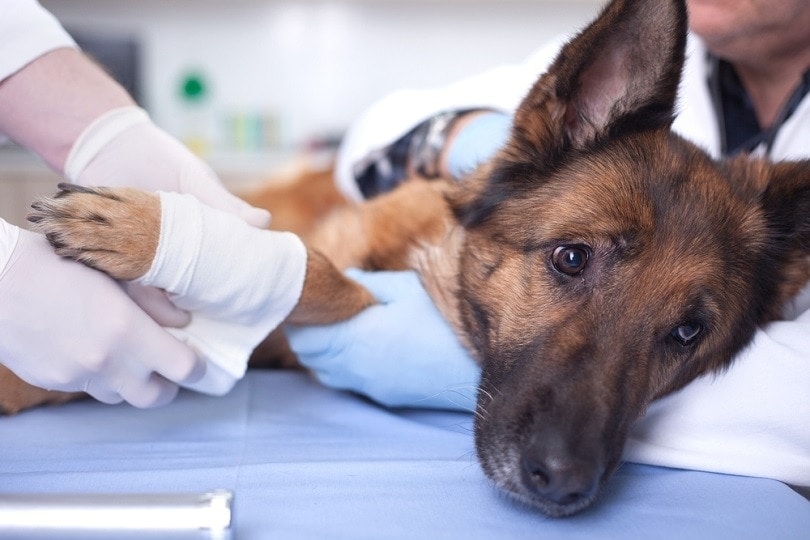
Of all the things that could happen, your dog has to get a broken bone. Broken bones are painful in the physical sense and the financial sense. It’s not cheap to correct a fracture. But here’s the good news: it’s not the most expensive vet procedure either, and it’s not a life-threatening issue. Depending on your dog’s fracture, you can move past this physical and financial setback within a few months.
That sounds like a long time, but the time passes quickly. So, how much does fixing your dog’s broken leg cost and what can you expect after? Let’s find out.

Why Your Dog May Need Broken Leg Surgery
In the past, some broken bones just couldn’t be fixed. But now, the majority of fractures can be repaired. It might surprise you that your dog needs surgery for a broken leg. After all, can’t a cast or splint do the job?
There are times when a cast and splint take care of the problem. However, bones can break in multiple places, requiring stainless steel pins or plates to correct the break. Otherwise, the bone may never heal properly.
Veterinarians recommend surgery based on what kind of fracture your dog has, age, and other injuries your dog may have suffered. Veterinarians also consider any financial limitations you may have.

How Much Does Broken Leg Surgery Cost?
How much your dog’s surgery will cost depends on a few factors, such as:
If your dog has a broken leg, you’ll have to go to an emergency hospital instead of a general practice clinic, and these office visits can cost anywhere between $60 to $200.
This doesn’t include the surgery, which can range from $200 to $2,000 or more, depending on the fracture. If your dog only needs a splint or cast, the cost shouldn’t exceed $1,000. But you should expect to pay around the $2,000 range if your dog’s leg requires surgery.
This price includes everything that goes into the surgery, like IV catheter placement and fluids, anesthesia medication, surgical monitoring equipment, bloodwork, and x-rays.
Additional Costs to Anticipate
Your dog’s age, temperament, and overall health also affect how much the surgery will cost. Older dogs (or dogs with health complications) are a little tricky in surgery because they require closer monitoring and frequent use of other surgical equipment.
For example, the doctor may need to monitor things like blood pressure and blood work a little more closely. Your veterinarian may also need to use different medications based on your dog’s health and how your dog responds to the medicine. Sometimes, this can prolong a procedure and uses resources. However, you shouldn’t worry if your dog is older. It just means that your veterinarian will need to make adjustments.
On top of that, anxious or aggressive dogs are difficult to handle and may bite if anyone tries to touch their leg. This isn’t the dog’s fault. But it may have to be sedated so the doctor can examine the leg, adding a few extra dollars to the overall bill.
The point is that you should expect to pay a little more if your dog is a senior, has health complications, or has an anxious temperament.
General Practice vs Emergency Hospitals
Like in human medicine, animals have general practice veterinarians, emergency hospitals, and specialists to help your dog. Your general practice veterinarian will refer you and your dog to a specialist if your dog needs to see one.
Odds are, you’ll need to go to an emergency hospital to treat your dog’s broken limb. Emergency hospitals have special surgical equipment that most general practice vet offices don’t keep on hand.

Shelters and Low-Cost Clinics
Finding out your dog has a broken limb and not being able to fix it is a common struggle with pet owners. If you’re in this situation, call your veterinarian and ask about low-cost clinics or hospitals that offer payment plans.
Animal shelters and low-cost clinics typically don’t provide surgical services like fixing a broken limb unless it’s for an animal living at the shelter. However, low-cost clinics sometimes offer help with x-rays and bloodwork. So even if you can’t pay for the entire procedure out of pocket, you may be able to find support for the other expenses.
Thankfully, many vet offices accept Care Credit if getting a medical credit card is something that interests you.
What to Do for Your Dog After Surgery
So, what does life look like after your dog has undergone surgery?
Post-operative care looks different for every dog. It depends on your dog’s age, the type of fracture it endured, and if your dog has other health conditions.
After surgery, your dog will need to spend an extra day or two at the hospital for post-operative care. This is to ensure your dog wakes up from anesthesia comfortably and its vitals are normal before being sent home. Veterinarians also want to ensure the surgical site doesn’t become infected and that all the pins and plates stay in place.
The day you pick your dog up from the hospital is exciting. But it’s also essential to stay focused and listen to the doctor’s instructions. A detailed list of at-home instructions for caring for your dog will be sent home with you.
This list includes:
It’s difficult to know how long your dog will be on bed rest. Every surgery and fracture is different and requires various healing periods. Generally, you can expect your dog to return to everyday life after three or four months.
How Often Should I Follow Up With My Vet?
How often you follow up with your vet depends on how your dog heals during post-op. You should expect to visit your vet at least twice after surgery for bandage changes and mobility checks. This doesn’t include if your dog needs physical therapy. Your doctor will tell you if more follow-up appointments are necessary.

Does Pet Insurance Cover Dog Broken Leg Surgery?
Absolutely! Accidents happen to all of us, and pet insurance is there to help. Pet insurance will reimburse you for most of the procedure if you sign up for pet insurance and go through the waiting period before the accident occurs. Every pet insurance company offers different reimbursement rates and monthly prices. It’s wise to research the best pet insurance companies and select one that provides the best coverage within your budget.

Conclusion
Broken limbs are painful, and they’re not cheap to fix. But here’s the good news- broken bones heal. Of all the worst-case scenarios, a broken bone isn’t too bad. It literally costs an arm and a leg, but the $2,000 price tag is better than other pet care treatments. You can always ask for help from your veterinarian, friends, and family. Take a deep breath, pick up the phone, and call around. There are people who want to help.
Featured Image Credit: VP Photo Studio, Shutterstock

